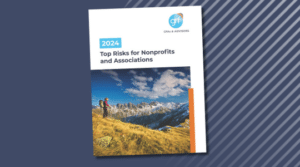January 30, 2024
At the start of 2024, the landscape of risks facing organizations is evolving at an unprecedented pace.
The Risk & Advisory Services team at GRF has meticulously analyzed the top risks predicted by political, economic, and business experts, as well as insights from more than 40 years of experience serving nonprofits and associations.
The resulting report explores the top risk themes for 2024 and the potential implications for nonprofits and associations. Major themes include:
Cybersecurity threats are accelerating
Cybersecurity has skyrocketed to the number one slot on many surveys and experts’ risk rankings for 2024. As organizations become more digitally connected and reliant on third-party technologies, external data sources, and outside service providers, they become more exposed to direct attacks and more vulnerable to the financial, operational, and reputational consequences of an attack on a vendor or partner.
At the same time, cybercriminals are becoming more sophisticated, often with the assistance of artificial intelligence (AI), leading to more frequent attacks that are harder to prevent and counter.
Economic conditions remain uncertain
Most experts do not expect a strong economy in 2024. Inflation stabilized in 2023, but the risk of it picking up pace remains and, as a result, interest rates are likely to stay high. Protracted war in Europe and the potentially widening conflict in the Middle East could disrupt supply chains and increase energy prices. The El Nino weather pattern, which will affect most of the world in early 2024, may reduce food production and drive up food prices. Catastrophic natural disasters due to climate change will continue to be more frequent and have the potential to affect global supply chains and commodity markets as well as have significant localized economic impact.
Attracting and retaining talent continues to present challenges
As the pandemic recedes, disruptions to the labor market that were assumed to be temporary are becoming systemic challenges. Workforce shortages and skills gaps persist and will be exacerbated by demographic changes and shifting views on work-life balance. Higher compensation alone will not be sufficient to attract new staff. Workers of all generations, but especially the Millennials and Gen Z who are beginning to dominate the workforce, expect more from their employers. Employees are increasingly looking for flexible work schedules, career development opportunities, and workplace initiatives that advance diversity, equity, and inclusion.
Elections and global conflict complicate long-term planning
An unprecedented number of elections will occur in 2024 with a greater share of the world’s population heading to the polls for nationwide elections than has ever occurred. As a result, there is tremendous uncertainty globally about everything from the continuity of economic policy to action on climate change to military engagement. Some elections will not be free and fair, so the outcomes are not in doubt. Others are unlikely to cause major disruption or result in significant policy changes, but the potential for significant changes and unrest exists throughout the world in 2024. Regardless of the outcome, the election in the United States is likely to have a profound impact throughout the world.
2024 Top Risks for Nonprofits and Associations provides GRF’s assessment of how these major themes are likely to impact nonprofits and associations, and how you can address these threats. The appendices include detailed summaries and links to the research reports referenced, including insights from The Enterprise Risk Management (ERM) Initiative at NC State University’s Poole College of Management, the World Economic Forum, the Internal Audit Foundation, AuditBoard, AXA, S&P Global Ratings, The Economist Group, and more.




